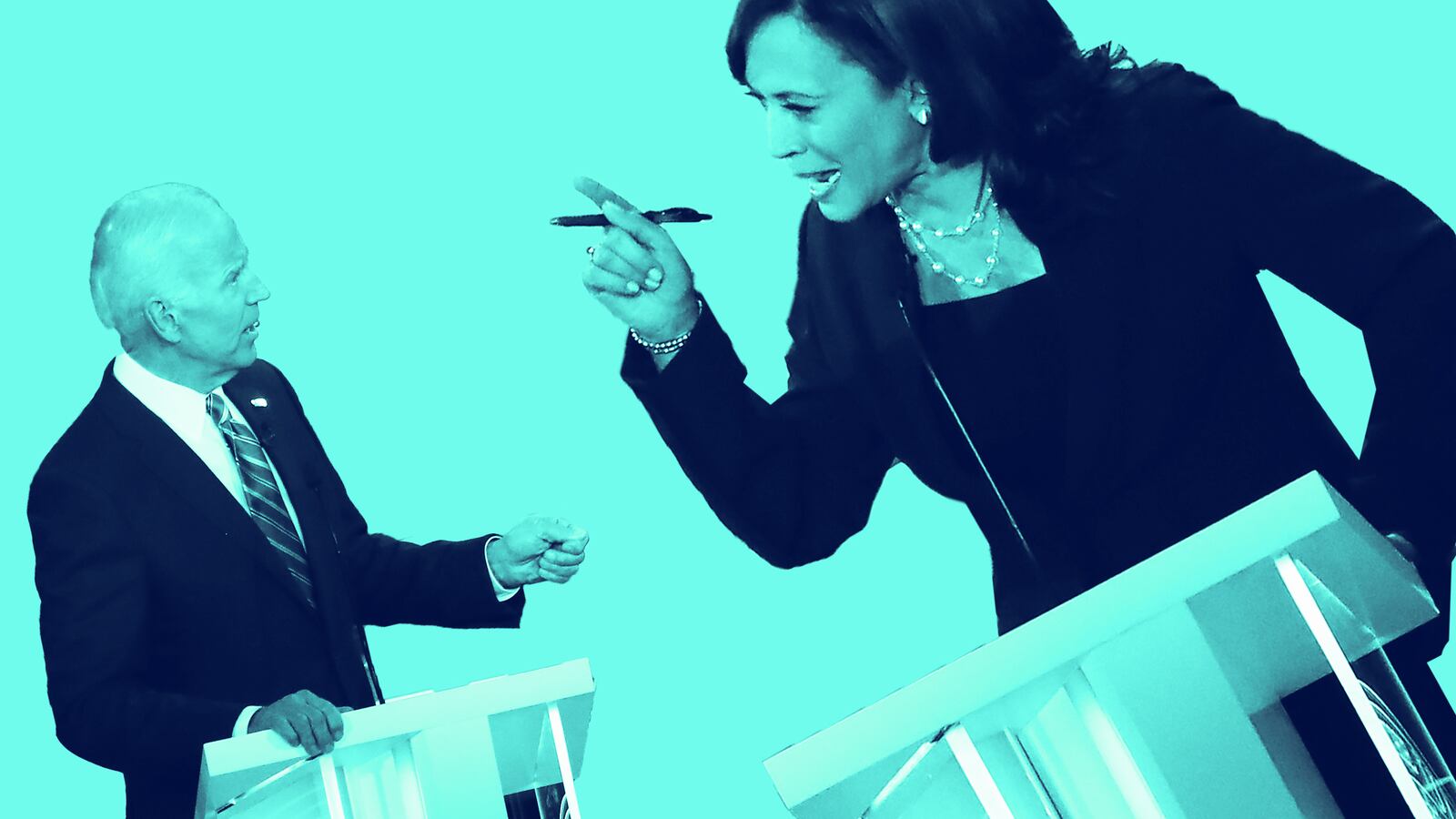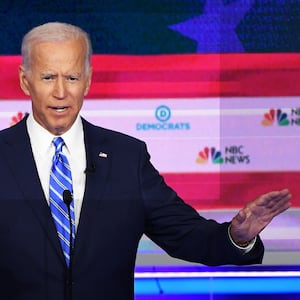So, a funny thing has happened in the 11 days since we all agreed that Kamala Harris crushed Joe Biden like a grape. She’s the one who has changed her position on the issue at hand, school busing, while he has stood pat on his.
So maybe she didn’t win that moment quite so overwhelmingly after all?
She certainly helped her standing, and deservedly so—it was a shrewd way to stand out in a cacophonous and frankly too-fast-paced setting. Also, in that moment, she accomplished a key thing that had nothing at all to do with the substance of the issue: She made it possible for millions of people to envision her debating Donald Trump and making grape juice out of him, too.
But the fact remains that she has danced away from the position that was implied in her rhetoric that night. She’s been asked and asked about the issue by reporters covering her on the trail, and after the first few days, when she seemed to be supporting a position in favor of enforced busing, she’s backed away from that, saying that busing should be available as “a tool among many that should be considered” for local school districts, but she was against mandated busing.
There is a fair amount of voluntary busing happening in the United States right now, so she’s basically just saying she supports the status quo.
Biden, meanwhile, has decided that his best play is to admit to being against mandatory busing in the 1970s. “You had overwhelming response from the African-American community in my state,” Biden told CNN’s Chris Cuomo over the weekend. “They did not support it.” One Gallup poll from 1973 found support for busing in single digits among both white and black parents.
So, what have we learned from all this? Four important things. First, about the issue itself; second, about the early dynamics of the left-center tension in the race and the Democratic Party; third, about Harris; and fourth, about Biden.
About the issue. I’m elated, as any liberal should be, that the broader topic of school resegregation is being discussed. This is one of the great blots on this country today, and in its recent history. They taught us in school how historic Brown v. Board was; they never taught us that vast chunks of the country just ignored it for decades.
The Supreme Court’s 2007 decision in the Louisville-Seattle case, which you’ve probably read about by now, is one of the Roberts court’s most reactionary decisions. It nixed even voluntary desegregation efforts based on race. This gave cities and districts that wanted to re-segregate all the excuse they needed. But many other localities didn’t want that, and they’ve spent years formulating admirable and hard-to-achieve workarounds.
Richard Kahlenberg of the Century Foundation is one of the country’s leading experts on all this and has worked with numerous school districts on integration plans. Over the weekend he shared with me two reports that I commend to you. The first, from this April, is “A Bold Agenda for School Integration.” The third section lays out the ways that the federal government can help districts achieve better integration. The second, from 2016, is “School Integration in Practice: Lessons from Nine Districts.” Eden Prairie, Minnesota, for example (it’s outside Minneapolis), redrew its school districts. It was plenty contentious, but it has resulted in increased integration and better test scores.
One thing almost no one is relying on? Busing. “We've learned a tremendous amount about how to integrate schools in a politically feasible manner over the past few decades,” Kahlenberg says. “Virtually no one in the civil rights community advocates mandatory busing; instead, the effort is to provide public school choice with fairness/civil rights guardrails to ensure that choice results in integration.”
I’d love it if the Democrats have this debate and bring this issue more attention. Maybe—hoping against hope here—at the next debate, one of the moderators will ask something that isn’t a stupid gotcha question but is actually a question of substance on the issue.
About the left-center tension. This could easily have devolved into an ugly, Twitter-dominated, litmus-test shouting match in which the conclusion was that the candidates who opposed busing—a policy that, as Kahlenberg says, almost no one who actually works on these issues supports—would be lambasted as Jim Crow racists. Happily, it did not.
It played out this way only because Harris backed off her initial position, but at least that does prove that forced marches to the embrace of unpopular positions aren’t inevitable.
About Harris. One can’t help but notice that this is the second time after the same debate that she stood down after at first taking what you’d call a more left-wing position. The first of course was on the elimination of private health insurance. She started walking that one back the morning after, presumably because the potential damage was obvious. On this one, it took a little more time, because the unpopularity of her position was obscured by the force of her knockout punch at the debate.
Mind you, she’s right to distance herself from both of these positions. But it does make you wonder how much of that she can get away with doing. One of these days, the criticisms from the left of her record as prosecutor are going to take center stage. She’ll need to defend that record in a more forthright way.
About Biden. There are two schools of thought on Biden. One is that he’s already cooked. He just looked too old, too unsteady, like a lion who can’t hunt anymore and should just wander off into the desert. The other, to put it simply, is yes, he was terrible, but it was just one night.
I’m not in the cooked camp just yet, but one wonders if he has the chops. His obvious answer to Harris was something like: Busing was a uniquely divisive issue, even many African-American parents were against it; but look, my name is on more pieces of civil rights legislation than everybody else on this stage combined. Which is probably true. But as David Frum asked, why couldn’t he think of that?
The perception is that he has an inflated sense of his own rectitude: How dare these people challenge me, I was fighting Strom Thurmond when they were learning to tie their shoes. Which again may be true but isn’t the point. He has to earn the nomination just like anybody else, and being dismissive and defensive won’t cut it, with young voters in particular.
So there we are. Both candidates face challenges, but substantively, we seem to have come out all right. It could be, and probably will be, much worse.






